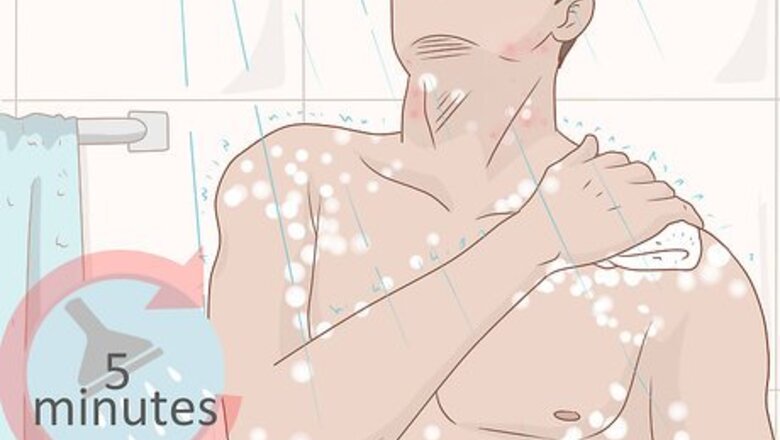
views
Dealing with Cracked, Itchy or Dry Skin

Take cool, brief showers. Accutane is notorious for drying out the skin. Cool water showers will dry your face out less and can keep the side effects of the medication at bay. Long showers and baths dry out your skin, so try to limit your time bathing to 5 to 10 minutes. Pat your skin dry rather than wiping it to avoid damaging your skin.

Use a mild or dry shampoo when washing your hair. Regular shampoos can leave your scalp dry and itchy. If you experience dry scalp while on Accutane, switch to a mild or non-medicated, gentle shampoo. Make sure to wash the product out completely, and only wash your hair when necessary.
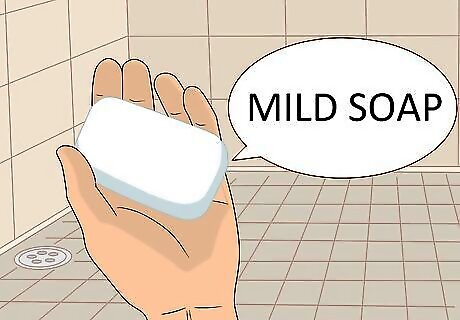
Use a mild soap when bathing and washing your hands. Look for soaps made with natural ingredients like olive oil, lavender, chamomile, coconut oil, peppermint, and honey. Mild soaps don’t use artificial fragrances or chemicals and are free of antibacterial agents. As an alternative, you can also use a cleanser meant for sensitive skin. Read your labels and make sure soap is for sensitive skin and fragrance-free.
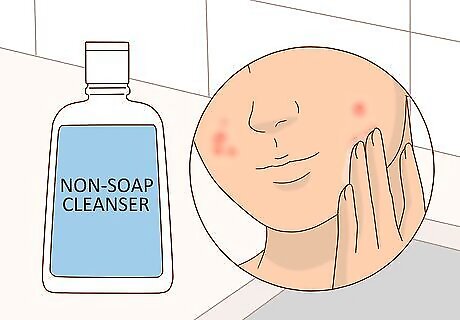
Use a non-soap cleanser if you have sensitive skin. A non-soap cleanser, used sparingly, can be an acceptable alternative to using mild soap. Like the mild soap, any cleanser you use should be free of chemicals and preservatives and include natural oils and herbs among its main ingredients. Specific directions for use will depend on your non-soap cleanser. Most come in the form of lotions. To use lotion-type cleansers, squirt a little on the fingertips, then rub it gently into the skin. Rinse excess off with water or wipe away with a tissue.

Use a moisturizer after showering. Look for moisturizers that use natural ingredients and include a minimum of chemicals. Natural ingredients in your moisturizer might include brown sugar, macadamia nut oil, shea butter, and oatmeal. Cream-based moisturizers are more effective than water-based moisturizers for treating dry skin. Read labels before purchasing a product to ensure that no perfume is added and the product is alcohol-free. Moisturizer can be applied to dry or cracked skin as needed by dabbing a bit on your fingertips and working it into the affected area with gentle, circular motions.

Use a humidifier. A humidifier, especially in cool or cold weather, can dramatically improve skin quality. Invest in one for your home and a smaller one for your workspace to help treat and moisturizer your skin.
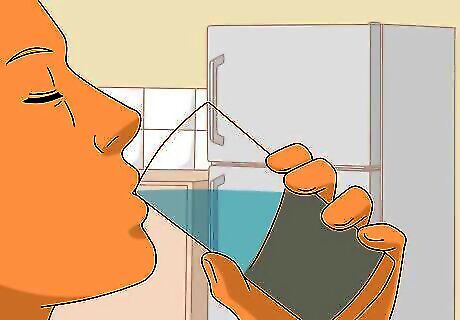
Drink plenty of water. It’s important to keep yourself hydrated, especially while on Accutane. Aim to drink between 9 to 13 c (72 to 104 fl oz) of water a day for healthy skin.
Avoiding Scars while Using Accutane

Do not wax your skin. Because the skin thins during waxing treatments, you become more likely to scar. Wax epilations (waxing) should be avoided for at least 6 months after completing your Isotretinoin treatment.

Avoid getting laser resurfacing treatments. Ablative and non-ablative laser resurfacing, dermabrasion, and other acne scar revision techniques should be avoided while taking Accutane. During treatment, your skin is thinner than usual, leaving you more vulnerable to scarring.
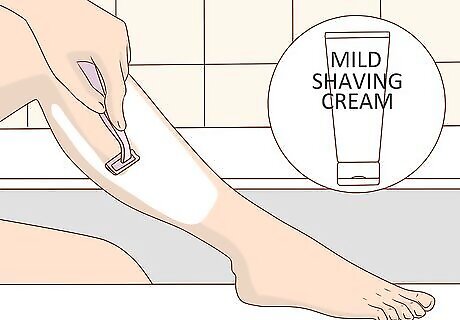
Shave hair as needed. Shaving can cause razor bumps and dry skin, so only remove hair if it’s completely necessary. If you must remove facial or leg hair while taking Accutane, do so using a safety razor and a mild shaving cream. If your skin is especially cracked or dry, use the suds of a mild soap or non-soap cleanser instead of shaving cream. Take care when shaving. Do not use straight-edge razors, as these can upset your skin more.
Dealing with Photosensitivity
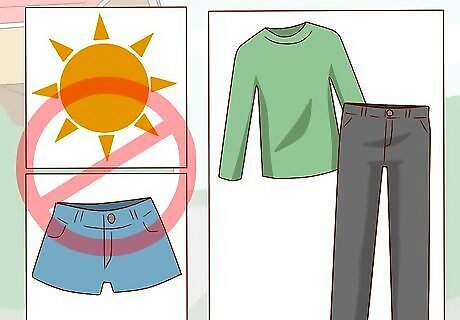
Avoid extended exposure to sunlight. If you can stay inside, do so. Cover your arms with long sleeves and legs with pants if you go out on sunny days to limit the amount of sunlight you’re exposed to.
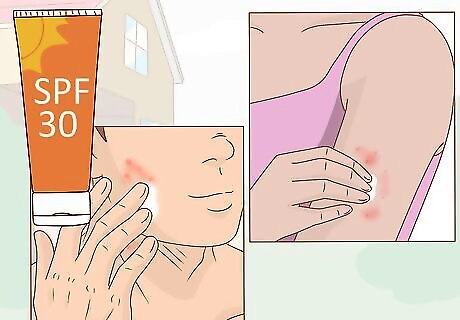
Use sunscreen and avoid prolonged sun exposure. Apply a sunscreen with at least SPF 30 to your face, neck, and hands (and any other exposed skin) before going outside. Wear hats and use umbrellas if you know you’ll be in direct sunlight.
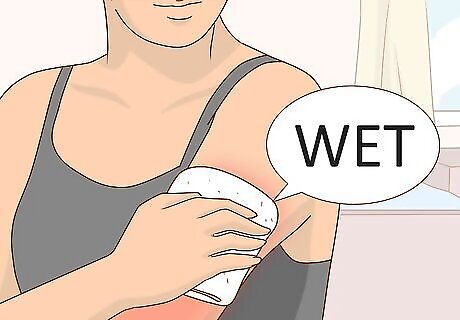
Treat sunburn with cool water compresses. Wet a rag or cloth under cool tap water and apply it to the burned area for 10 minutes. Repeat 3 to 4 times each day or as needed. An aloe vera-based lotion can be used to relieve pain as well. If your sunburn is more serious and begins to peel, consult a dermatologist.
Taking Care of Your Lips
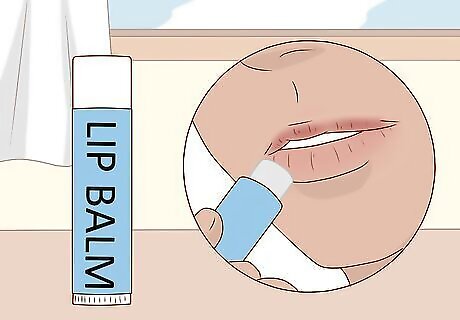
Use lip balm regularly. Cheilitis (chapped lips) is a common side effect of accutane treatment. To prevent and treat chapped lips, apply a lip balm of your choice. Some have a pleasant scent, like lavender or wild berry, while others are unscented. The most hygienic lip balms come in a small retractable tube, as you don’t have to touch your hand to your lips to apply the balm.

Use Vaseline or Aquaphor Healing Ointment for very chapped lips. If lip balm is ineffective, use something stronger to protect your chapped lips. Vaseline or Aquaphor can be applied by dipping your pinky in the container and applying a light coating to your lips or around your mouth as needed.

Use OTC hydrocortisone ointment for parched lips. Use a 1% ointment for extremely dry lips. Apply the ointment 2 to 3 times each day in addition to using Vaseline, Aquaphor, or lip balm. You could also use a low-potency corticosteroid ointment if you get a prescription from your dermatologist. Using corticosteroid treatments for more than a few days could lead to thinning of the skin on your lips or the enlargement of blood vessels where you applied the ointment. Always use ointments and prescription medications as directed.
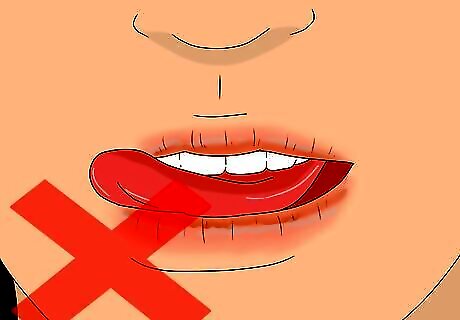
Avoid licking your lips. While it may provide temporary relief, the enzymes in saliva can irritate your skin. The more you lick your lips, the drier and more painful they will become over time. Keep your tongue in your mouth and apply lip balm instead as needed.

















Comments
0 comment